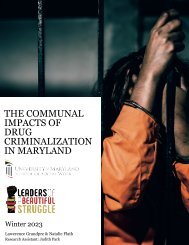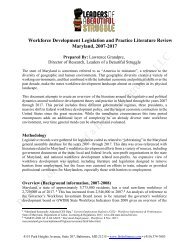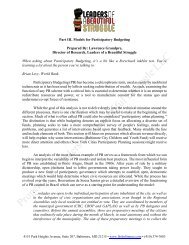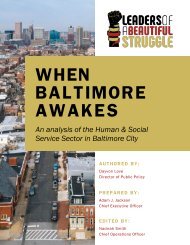Drug Decriminalization in Maryland Through an African Centered Research Paradigm- Analysis and Recommendations
This document offers guidance for theorizing questions related to a proposed research project purposed to advance drug decriminalization in Maryland.
This document offers guidance for theorizing questions related to a proposed research project purposed to advance drug decriminalization in Maryland.
- No tags were found...
You also want an ePaper? Increase the reach of your titles
YUMPU automatically turns print PDFs into web optimized ePapers that Google loves.
arrier to deep cuts built solely on nonviolent offenders.<br />
Maybe deep reforms really aren’t the goal. Maybe the goal is merely to<br />
release prisoners who really don’t scare us, but otherwise leave th<strong>in</strong>gs<br />
untouched. That, however, doesn’t seem to match the rhetoric of<br />
tr<strong>an</strong>sformative ch<strong>an</strong>ge com<strong>in</strong>g from both the Left <strong>an</strong>d the Right.<br />
Furthermore, even if the goal is only the modest one of releas<strong>in</strong>g those who<br />
“don’t scare us,” we should still be less punitive toward m<strong>an</strong>y of those who<br />
are serv<strong>in</strong>g time for violent crimes. Our current approach to punish<strong>in</strong>g those<br />
convicted of violence is almost entirely bl<strong>in</strong>d to mounta<strong>in</strong>s of sophisticated<br />
research about violent behavior. The harsh sentences we impose on people<br />
convicted of violent crimes are not buy<strong>in</strong>g us the security we th<strong>in</strong>k they are:<br />
they <strong>in</strong>capacitate people longer th<strong>an</strong> necessary <strong>an</strong>d provide little deterrence<br />
<strong>in</strong> exch<strong>an</strong>ge. It’s a situation that begs for real reform.” (Pfaff , 2018b).<br />
When decrim<strong>in</strong>alization attempts to tactically limit its frame to non-violent drug offenders,<br />
this creates a strategic limitation to comprehensive de-<strong>in</strong>carceration. Moreover, decrim<strong>in</strong>alization<br />
advocates have often explicitly made the po<strong>in</strong>t that decrim<strong>in</strong>alization would allow more resources<br />
to focus on “more serious crimes”.<br />
“Along with ch<strong>an</strong>ges <strong>in</strong> medical mariju<strong>an</strong>a laws, more recent state-level reforms have<br />
decreased the crim<strong>in</strong>al punishments related to low-level possession or have legalized lowlevel<br />
possession altogether.S<strong>in</strong>ce 2012, when both Wash<strong>in</strong>gton <strong>an</strong>d Colorado approved<br />
legislation allow<strong>in</strong>g for adult recreational use, 10 states <strong>an</strong>d Wash<strong>in</strong>gton, D.C., have<br />
legalized small amounts of recreational mariju<strong>an</strong>a for adults (as of year-end 2018).<br />
Additionally, some states have decrim<strong>in</strong>alized or depenalized small amounts of mariju<strong>an</strong>a<br />
possession for adult recreational use (National Conference of State Legislatures, 2019).<br />
These permissive policy ch<strong>an</strong>ges of the last decade occur <strong>in</strong> stark contrast to the policies<br />
of the “War on <strong>Drug</strong>s" era of the 1980s <strong>an</strong>d early 1990s, which crim<strong>in</strong>alized drug use <strong>an</strong>d<br />
prioritized enforcement of drug offenses. Depenalization, decrim<strong>in</strong>alization, <strong>an</strong>d similarly<br />
permissive policies aim to do the opposite — reduce enforcement of low-level drug offenses<br />
<strong>in</strong> exch<strong>an</strong>ge for <strong>in</strong>creased resources to be allocated toward the prevention of more serious<br />
(e.g., violent) crimes (DeAngelo, Gitt<strong>in</strong>gs, & Ross, 2018; Mak<strong>in</strong> et al., 2019; Ross &<br />
Walker, 2016).” (Kozloski et al., 2019)<br />
Given calls to #DefundThePolice, <strong>an</strong>d the st<strong>an</strong>d<strong>in</strong>g reality of racial bias <strong>in</strong> the crim<strong>in</strong>al legal<br />
system, the question of whether defacto <strong>in</strong>creas<strong>in</strong>g police resources is a desirable outcome is<br />
debatable. This is especially glar<strong>in</strong>g when contrasted with <strong>an</strong> alternative of re<strong>in</strong>vest<strong>in</strong>g this money<br />
<strong>in</strong> communities most impacted by the war on drugs, a prospect which is rarely mentioned <strong>in</strong><br />
decrim<strong>in</strong>alization literature even though discussion of reorient<strong>in</strong>g resources from drug<br />
enforcement to other org<strong>an</strong>s with<strong>in</strong> the polic<strong>in</strong>g apparatus.<br />
4151 Park Heights Avenue, Suite 207, Baltimore, MD 21215 • www.lbsbaltimore.com • (410) 374-7683









